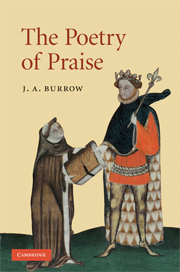Book contents
Chapter 4 - Geoffrey Chaucer
Published online by Cambridge University Press: 22 September 2009
Summary
In some lines written about fifteen years after the poet's death, John Lydgate recorded an anecdote about Chaucer which he had perhaps heard from Chaucer's own son Thomas. In celebration of what he calls Chaucer's ‘well-saying’, Lydgate instances his way of responding when asked by others to comment on their writings:
For he þat was gronde of wel seying
In al hys lyf hyndred no makyng.
My maister Chaucer, þat founde many spot,
Hym liste nat pinche nor gruche at every blot,
Nor meve hym silf to perturbe his reste
(I have herde telle) but seide alweie þe best,
Suffring goodly of his gentilnes
Ful many þing enbracid with rudnes.
One can see here the lineaments of that inscrutable, sometimes ironical Chaucer that is so familiar from his own writings, not least in his poetry of praise. He sees faults, but does not choose to speak ill of them, lest by doing so he should ‘perturb his rest’. So he always ‘says the best’. No doubt poets who (like Thomas Hoccleve) submitted their work to the master's eye went away without knowing quite what to make of him. Did he or did he not really think well of what they had written?
Readers of the General Prologue to the Canterbury Tales encounter a similar Chaucer, who also ‘says always the best’ – the affable pilgrim narrator. From the moment when the pilgrim checks in at the Tabard Inn, he strikes the note of praise:
The chambres and the stables weren wyde,
And wel we weren esed atte beste.
1. 28–92- Type
- Chapter
- Information
- The Poetry of Praise , pp. 101 - 149Publisher: Cambridge University PressPrint publication year: 2008



